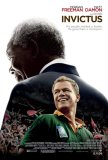Invictus (United States, 2009)
December 08, 2009
With the election of Barack Obama, we have apparently entered a kinder, gentler world in which films about racial harmony and goodwill to all men are becoming commonplace (at least during awards season). How else to explain the presence of both The Blind Side and Invictus within the first year of Obama's term? Both are transparent Oscar bait - they are inspirational and earnest, but each preaches a little too loudly. That's one of two problems with Invictus: it makes its point early about the power of sports as a force of unification then beats us over the head by repeating that idea ad nauseam. The second issue is that the movie is poorly edited; the inclusion of too much extraneous material adds about 20 minutes to the length and results in parts of the story feeling unfocused. Still, the overall experience is uplifting and enjoyable. History has pre-determined the outcome but, flaws aside, Eastwood has crafted something that works both as a sports drama and as an examination of the birth pains of the racially unified South Africa.
Invictus (the title is Latin for "unconquered") opens with the 1994 ascension of Nelson Mandela (Morgan Freeman) to the presidency of South Africa. With apartheid officially ended, Mandela must work to achieve harmony through unification. Some of his methods are unconventional, such as pushing for the South African rugby team, the Springboks, to win the 1995 World Cup, which is being hosted in South Africa. Led by tough-as-nails player Francois Pienaar (Matt Damon), the team competes far better than expected and the players learn not only tolerance but how to become heroes and role models for both white and black South Africans.
The film comes complete with heavy doses of the behind-the-scenes machinations of politics. For example, there is a strong push within South Africa to disband the Springboks and ban their gold-and-green colors. Beloved primarily by Afrikaners (they have only one black player), the team symbolizes to some a residue of apartheid. Mandela, however, argues that eliminating the Springboks would antagonize and further alienate the white population - something he does not want to do. Instead, he campaigns for the team to be embraced not only by its core fans but by blacks as well. As a result, their participation in the World Cup becomes a source of national pride, irrespective of skin color.
Invictus incorporates tangential subplots that accomplish little beyond inflating the running time. One involves the integration of the President's security forces. Aside from mirroring the country's turmoil, this offers little that's new or interesting, especially since there's no payoff. The way these scenes are presented, we are misdirected into believing there will be an attempt on Mandela's life. When that doesn't happen, we're left wondering why so much time is spent on these secondary characters. An associated problem is that there's some unease in the marriage between the account of Mandela's first year in office and the traditional sports story. There are connections but they are clumsily introduced. At times, Invictus seems like two movies compressed into one. The only reasonably developed character is Mandela. The only reason we know who Francois Pienaar is, is because he's played by Matt Damon. His character traits are: plays rugby, is respected by his fellows, comes to believe in Mandela, and has an attractive wife. And he's among the most fully fleshed out of the players. So, instead of spending time to enhance individuals like Pienaar, the screenplay funnels time and energy to examples of how the black and white members of the President's bodyguard team come to trust each other.
There's no debating that the message of Invictus is worthy, but there are times when its repetition elevates it to a level that's almost sanctimonious. Eastwood goes overboard in depicting the unifying power of sports. The most cloying example is a little black boy who hangs around a taxi to hear the broadcast of the game on the car radio. At first, the white driver tries to shoo him away. By the end of the game, they are celebrating together. The point has been adequately made without this additional, pointless display of theatrics.
If these criticisms seem a bit harsh, it's because the movie had the potential to be one of the truly great inspirational sports movies. Although its flaws keep it from achieving that level, it's still a strong piece of mass market filmmaking. The message is undeniably positive, there are enough details about the difficulties faced by Mandela to recall how divisive a time it was in South Africa, and everything builds to the kind of rousing climax that a sports movie demands. Invictus is engaging enough that it's easy to forgive, if not overlook, its problems. Like The Blind Side, it offers a more hopeful view of humanity than something like 2012. Frank Capra would be pleased.
Invictus (United States, 2009)
Cast: Morgan Freeman, Matt Damon
Screenplay: Anthony Peckham, based on Playing the Enemy by John Carlin
Cinematography: Tom Stern
Music: Kyle Eastwood, Michael Stevens
U.S. Distributor: Warner Brothers
U.S. Release Date: 2009-12-11
MPAA Rating: "PG-13" (Profanity)
Genre: DRAMA
Subtitles: none
Theatrical Aspect Ratio: 2.35:1

Comments